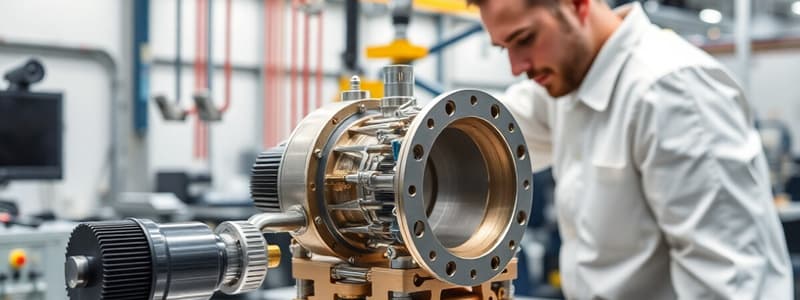Podcast
Questions and Answers
What is MED111 according to the text?
What is MED111 according to the text?
- Manufacturing Engineering
- Principles of Design and Manufacturing Engineering (correct)
- Institute Elective A
- Mechanical Manufacturing Engineering
What is the meaning of DFM?
What is the meaning of DFM?
- Design for Management
- Design for Machines
- Design for Manufacturing (correct)
- Design for Marketing
What does PLM stand for?
What does PLM stand for?
- Production Lifecycle Management
- Product Line Management
- Process Lifecycle Management
- Product Lifecycle Management (correct)
What are the five principles of DFM?
What are the five principles of DFM?
What are the two main components of the course assessment?
What are the two main components of the course assessment?
The correct answer, according to the text, is that the "Principles of Design & Manufacturing Engineering" course focuses on the fundamental concepts and practices involved in designing and producing products.
The correct answer, according to the text, is that the "Principles of Design & Manufacturing Engineering" course focuses on the fundamental concepts and practices involved in designing and producing products.
This course focuses on building products based on simple principles.
This course focuses on building products based on simple principles.
DFM is considered an unimportant process within the product development cycle.
DFM is considered an unimportant process within the product development cycle.
Design for Manufacturing (DFM) is a complex and lengthy process that should only be applied late in the product cycle.
Design for Manufacturing (DFM) is a complex and lengthy process that should only be applied late in the product cycle.
The focus of DFM is to primarily decrease costs and increase complexity.
The focus of DFM is to primarily decrease costs and increase complexity.
Flashcards
What is Product Lifecycle Management (PLM)?
What is Product Lifecycle Management (PLM)?
Product lifecycle management is a comprehensive strategy that oversees all stages of a product's existence, from its initial idea to its final disposal.
What are the key components of PLM?
What are the key components of PLM?
PLM integrates people, data, processes, and systems to streamline product development and ensure smooth operations. It covers all aspects of a product's life, including design, manufacturing, marketing, sales, service, and retirement.
What are the benefits of adopting PLM?
What are the benefits of adopting PLM?
PLM aims to enhance product quality, reduce costs, and accelerate time to market. It helps companies optimize resources and make informed decisions throughout a product's lifecycle.
What is Design for Manufacturing (DFM)?
What is Design for Manufacturing (DFM)?
Signup and view all the flashcards
Why is DFM important?
Why is DFM important?
Signup and view all the flashcards
What are the five principles of DFM?
What are the five principles of DFM?
Signup and view all the flashcards
How does the "Process" principle of DFM work?
How does the "Process" principle of DFM work?
Signup and view all the flashcards
How does the "Design" principle of DFM work?
How does the "Design" principle of DFM work?
Signup and view all the flashcards
How does the "Materials" principle of DFM work?
How does the "Materials" principle of DFM work?
Signup and view all the flashcards
How does the "Environment" principle of DFM work?
How does the "Environment" principle of DFM work?
Signup and view all the flashcards
How does the "Testing" principle of DFM work?
How does the "Testing" principle of DFM work?
Signup and view all the flashcards
What is the role of design in product development?
What is the role of design in product development?
Signup and view all the flashcards
What is the role of manufacturing in product development?
What is the role of manufacturing in product development?
Signup and view all the flashcards
How are design and manufacturing interconnected?
How are design and manufacturing interconnected?
Signup and view all the flashcards
What are the key activities involved in design?
What are the key activities involved in design?
Signup and view all the flashcards
What are the key activities involved in manufacturing?
What are the key activities involved in manufacturing?
Signup and view all the flashcards
How does design impact manufacturing efficiency?
How does design impact manufacturing efficiency?
Signup and view all the flashcards
How does manufacturing impact design decisions?
How does manufacturing impact design decisions?
Signup and view all the flashcards
How can design and manufacturing be integrated effectively?
How can design and manufacturing be integrated effectively?
Signup and view all the flashcards
What is production planning?
What is production planning?
Signup and view all the flashcards
What is production control?
What is production control?
Signup and view all the flashcards
What is quality control (QC)?
What is quality control (QC)?
Signup and view all the flashcards
What is quality assurance (QA)?
What is quality assurance (QA)?
Signup and view all the flashcards
What is materials handling?
What is materials handling?
Signup and view all the flashcards
What is inventory control?
What is inventory control?
Signup and view all the flashcards
What are production processes?
What are production processes?
Signup and view all the flashcards
What is machining?
What is machining?
Signup and view all the flashcards
What is casting?
What is casting?
Signup and view all the flashcards
What is forming?
What is forming?
Signup and view all the flashcards
What is assembly?
What is assembly?
Signup and view all the flashcards
How does robotics technology impact manufacturing?
How does robotics technology impact manufacturing?
Signup and view all the flashcards
Study Notes
Course Information
- Course Title: Principles of Design & Manufacturing Engineering
- Course Code: MED111
- Course Credits: 3 hours (2 lectures + 1 tutorial)
- Prepared by: Dr. Emad A. Elsheikh
- Total Marks: 100
- Midterm + Final Project: 20 marks
- Quizzes: 5 marks
- Attendance: 5 marks
- Final Exam: 70 marks
- Assessment breakdown: Final Exam (70%), Year Work (Attendance, Midterm, Quizzes) (30%)
Course Objectives
- Understanding design principles, including product lifecycle management (PLM), design for manufacturability, and design for sustainability
- Acquiring knowledge of manufacturing processes like machining, casting, forming, and assembly
- Developing problem-solving skills in design and manufacturing
- Improving communication skills (verbal & written)
- Fostering teamwork and collaboration skills
Course Outline
- Introduction
- Mechanical components
- Motion and power transmission elements
- Standard machine elements (threads, fasteners, locking devices, keys, splines, gears, pulleys, bearings, pipe connections)
- Welding and riveting conventions
- Basics of machine elements design
- Stress analysis
- Basic machining processes
- Applications of robotics technology
Design and Manufacturing
- Design and manufacturing are closely related fields focused on product creation
- Design involves conceptualization, planning, and development of products; manufacturing focuses on actual production
- Design involves identifying customer needs, creating product concepts, developing prototypes, testing, refining designs, and ensuring functional, aesthetic, and economic requirements
- Manufacturing includes selecting appropriate processes, acquiring materials & equipment, producing products efficiently, ensuring quality control, and distributing to customers
- Design & manufacturing are interdependent; good design leads to efficient & cost-effective manufacturing, and effective manufacturing helps bring high-quality products to market
Product Lifecycle Management (PLM)
- PLM is a business strategy to manage the entire lifecycle of a product (from conception to retirement)
- PLM integrates people, data, processes, and business systems to create a unified product development strategy
- PLM improves product quality, reduces costs, and speeds up time to market
Design for Manufacturing (DFM)
- DFM is a process of designing components for easy manufacturing at a lower cost
- DFM involves lowering product complexity, optimizing performance, and redefining the product
- DFM is important in product development cycles due to its ability to lower cost and time savings by implementing DFM early in the process
- DFM involves all stakeholders (manufacturers, engineers, suppliers, designers) to consider every need during planning
- Five principles of DFM: Process, Design, Materials, Environment, and Testing
DFM Principles (details)
- Process: Selecting the right manufacturing process to use lower-capitalized strategies for cost-effective production; optimize processes to fit components considering tolerances and needed materials
- Design: Simple designs are preferred over complex ones to minimize cost, manufacturing/use, and maintenance risks; designs should follow good manufacturing principles with specific details for thicknesses, tolerances, texture, and consistency
- Materials: Choosing the right materials early on can save time & money; the choice of materials impacts cost and quality, and consider mechanical properties, flammability, conductance, and thermal properties
- Environment: Design parts with the intended operating environment in mind considering all conditions to allow proper performance; parts need to operate correctly in the expected environments
- Testing: All products and components need thorough testing to comply with industry standards (e.g., industry, internal, company standards); testing needs to be done throughout each DFM stage.
Studying That Suits You
Use AI to generate personalized quizzes and flashcards to suit your learning preferences.
Related Documents
Description
Test your knowledge on the fundamental principles of design and manufacturing engineering. This quiz covers manufacturing processes, mechanical components, and effective design strategies including sustainability and lifecycle management. Prepare to demonstrate your understanding of key concepts from the course.



